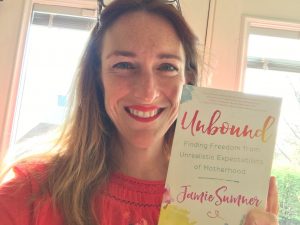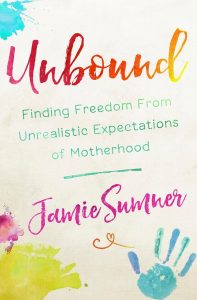Drunk on Ink Q & A with Jamie Sumner ‘Unbound: Finding Freedom from Unrealistic Expectations of Motherhood.’
Drunk on Ink is a blast interview series by Soniah Kamal author of the novel Unmarriageable a parallel retelling of Jane Austen’s Pride and Prejudice and set in contemporary Pakistan


Read Jaggery Issue 11 Spring 2018
Jamie Sumner is a writer and mom living in Nashville. She is the author of the book, Unbound: Finding Freedom from Unrealistic Expectations of Motherhood. She has written for The Washington Post, Scary Mommy and Parenting Special Needs Magazine and has an essay forthcoming in The New York Times. She is also an editor at Literary Mama. She can often be found at the park with her three kids, the dog and a large cup of coffee. All the writing happens when everyone else is asleep.
Publishers Weekly says…
Feeling imperfect? There are mom-books for that – offering solace in faith and welcome infusions of humor as well. Jamie Sumner, in Unbound: Finding Freedom from Unrealistic Expectations of Motherhood (FaithWords, April 10) describes her journey through infertility and special needs parenting. Her trip has not been easy, but Sumner found in the Bible stories of women who show her hope, companionship and triumph in releasing herself in God’s hands.
UNBOUND gives hope and encouragement to all women whose picture of motherhood is strained by disillusionment, otherness and even despair. Women do not talk enough about the reality of motherhood: the struggle it takes to get there, the loneliness of it, the unmet expectations. We are often too ashamed to share our difficult stories. We quietly absorb the posts of sonograms and happily messy houses on Facebook as we inwardly wonder what’s the matter with is. We struggle to meet the everyday needs and special needs of our kids, caught by surprise that this is what motherhood looks like. With honestly and vulnerability, JAMIE SUMNER walks readers through each stage of her own journey to motherhood through infertility and special needs parenting.
Soniah Kamal: First author/book you read/fell in love with?
Jamie Sumner: I have two books that wooed me at two very different times in my life. The first was C. S. Lewis’s The Lion, the Witch, and the Wardrobe. It was the first book to make me believe that magic could be hiding anywhere. The second was Anne Lamott’s Operating Instructions: A Journal of My Son’s First Year. I read it in the NICU after my son was born and felt for the first time that no, it’s not just me and this particular situation, all mothers feel this crazy.
To unwind: chai, coffee, water, wine?
Coffee to start. Wine to end.
A novel, short story, poem, essay, anything you believe should be mandatory reading?
As a former English teacher, my list is long. But I will say, Lord of the Flies. It’s such a testament to the unraveling chaos of our human nature when all the rules disappear. It’s like every single episode of Survivor made real.
Any classic you wished you’d pushed through in your teens?
Ah yes. Grapes of Wrath. I just couldn’t get through it. Steinbeck is a genius, but it took East of Eden to lure me in and make me go back for this one.
A favorite quote from your book?
I have two:
“Life is a continual etching and erasing. We form expectations and God forms reality. Sometimes they line up nicely, like tracings at right angles. And sometimes God plays Jackson Pollock and we’re all over the place.”
“Motherhood is often like this, a continually changing plan that has you kicking the tires and eating fried rice.”
Your favorite book to film?
The first Harry Potter. It is magic made perfect.
Favorite Indie Book Store/s?
Parnassus here in Nashville.
The one think you wish you’d known about the writing life?
I wish I had known that creation happens in secret, but promotion is one big loud shout through the megaphone. Being a professional writer in the modern world takes both the quiet and the noise.
Does writing/publishing/marketing get any easier with each story/novel published?
Nope. You build your platform and hope that street cred will get you places. But ultimately, each work must stand on its own. Marketing gets easier with practice, but the writing and publishing reset with each book.
Dog, Cat, Or?
Dog! I have had my Zoe longer than I have had my husband. She might be my soulmate.

Favorite book cover?
I love Rupi Kaur’s the sun and her flowers with the hand-drawn sunflowers. It’s simple and genius, much like her work.
Favorite song?
“Heavenly Day” by Patty Griffin. It makes me want to take a nap in a field.
Favorite Small Press and Literary Journal?
As an editor for Literary Mama, I have to vote for us on this one. We hit such a unique market—mothers who write, and write well, and writers whose works hit on the mother-child relationship. We celebrate the famous and the up-and-coming and the great small press finds. We love it all.
Last impulse book buy and why?
I bought The Power by Naomi Alderman because I was 39th in the hold list at the library and needed in now. It was worth it.
More Drunk on Ink Interviews:
Mike Chen: Here and Now and Then, a novel
Ruth Franklin: Shirley Jackson A Rather Haunted Life, biography
Colleen Oakley: Before I Go, a novel
Emily Midorikawa: A Secret Sisterhood: The literary friendships of Jane Austen, Charlotte Bronte, George Eliot, and Virginia Woolf, biography
Shabnam Samuel: A Fractured Life, memoir
Elise Hooper: The Other Alcott, a novel
Anne Boyd Rioux: Meg, Jo, Beth, Amy: The Story of Little Women and Why It Still Matters, non fiction
Devoney Looser: The Making of Jane Austen, non fiction
Kristen Miller Zohn: The Currency of Taste- Gibbons Georgian Silver, coffee table book
Vanessa Hua, A River of Stars, novel
Chaitli Sen, The Pathless Sky, novel
Sonya Huber, Pain Woman Take Your Keys, memoir
Kathy Wilson Florence, Three of Cups, a novel
Sara Luce Look, Charis Books and More, independent book store
S J Sindu, Marriage of a Thousand Lies, a novel
Rosalie Morales Kearns, Kingdom of Men, a novel
Saadia Faruqi, Meet Yasmin, children’s literature
Rene Denfeld: The Child Finder, a novel
Jamie Brenner, The Husband Hour, a novel
Sara Marchant, The Driveway has Two Sides, memoir
Kirsten Imani Kasai, The House of Erzulie, a novel
Thrity Umrigar, The Secrets Between Us, novel
John Kessel, Pride and Prometheus, novel
Lisa Romeo, Starting with Goodbye: A Daughter’s Memoir of Love After Loss
Rachel May, An American Quilt: Unfolding a Story of Family and Slavery
Rebecca Entel, Fingerprints of Previous Owners, novel
Jamie Sumner, Unbound: Finding from Unrealistic Expectations of Motherhood
Falguni Kothari, My Last Love Story, novel
Tanaz Bathena, A Girl Like That, YA novel



